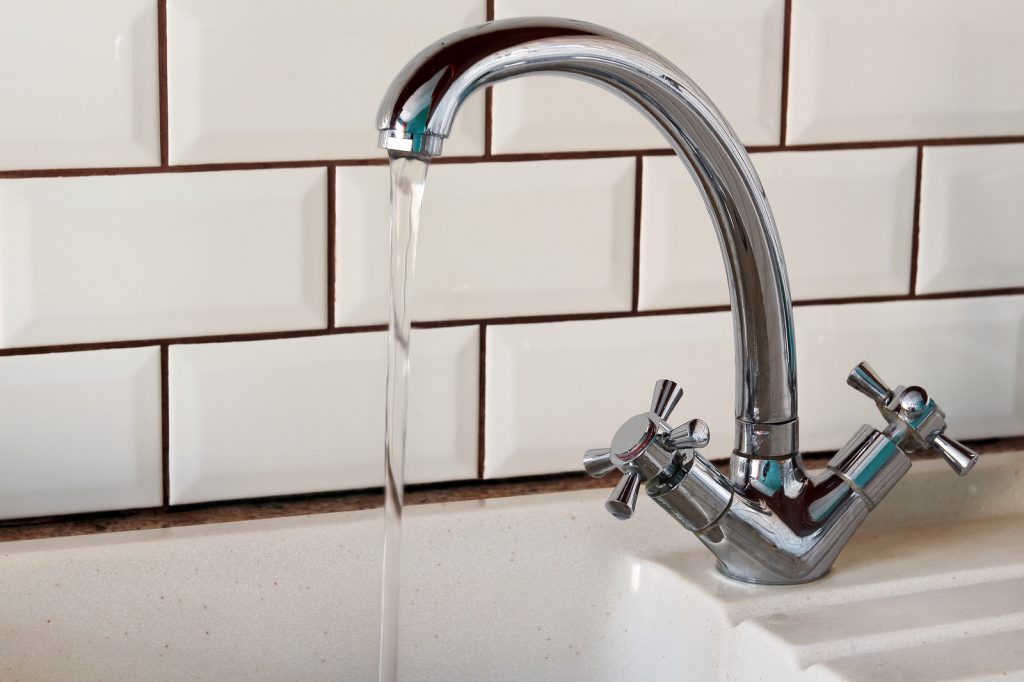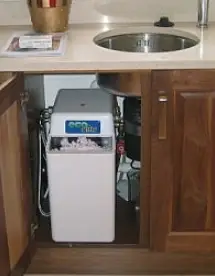Disclosure: Some of the links below are Amazon affiliate links. This means that, at no cost to you, we may earn an affiliate commission if you click through the link and complete a purchase.
A water softener is a piece of equipment used to treat mains water before it feeds into the boiler. It is considered vital in areas of the country that have hard water to keep the boiler working efficiently and maximising its operational lifespan. The softened water helps to reduce limescale buildup inside boilers, especially the heat exchanger.
Water softener for boilers
With many manufacturers, water softeners are recommended for the hot water supply as they help prevent scale build up. But some advise the central heating system to be filled with hard water along with using a chemical inhibitor. As it is a sealed system that shouldn’t have regular incoming fresh water, the inhibitor will be able to cope with the hard water.

Do boiler manufacturers recommend water softeners?
Vaillant combi boiler and water softener
Vaillant recommend water softener in areas of hard water or any type of scale prevention system, such as magnetic, electronic or additive.
Worcester Bosch boiler and water softeners
Worcester recommend water softener only in the hot water circuit to preserve efficiency and prevent scale. They do not recommend a water softener to be connected to the heating system but instead fill it with hard water and add a chemical inhibitor.
What does a water softener do?
In areas of the country with hard water, which is basically calcium and magnesium, deposits can get stuck in appliances that use water – such as boilers, washing machines and dishwashers.
Water softeners flush out these deposits so they don’t get stuck to components within appliances and cause damage. They are probably the easiest and most effective preventative steps you can take.
Best water softener for a combi boiler
Water softeners are essential for maintaining your boiler and ensuring that you utilise it to its maximum possible operational life. Not only do they prevent scaling and improve efficiency, but they also significantly reduce or completely eliminate the hassle and cost of chemical treatments to keep boilers clean.
With a water softener like this 4.4 star rating on Amazon Water2Buy EASY W2B200 Water Softener or this BWT WS555 Hi Flow Water Softener you can enjoy a longer lifespan for your combi boiler and save money on maintenance costs.
Where are water softeners installed?
They are often installed where the cold water mains pipe comes in, usually under the kitchen sink. Water softeners also need an unsoftened outlet on the system, and you can get this at the kitchen sink cold tap.
Signs of hard water in an area
Hard water is a problem in many areas. It manifests itself in causing kettles to scale up, as well as shower controls and bath taps. In boilers, hard water can scale up the insides of pipes and key components, lowering their efficiency and causing more frequent breakdowns as well as shortening the life of the boiler.
Building regulations do not require water softeners to be fitted with boiler but in areas of hard water, they are recommended.
Effects of hard water in a boiler
- Limescale buildup causes a blocked heat exchanger.
- Narrowing or blocking of pipes or boiler components.
- Reduces boiler efficiency.
- Increases risk of kettling within the boiler.
- Reduces water quality in the system.
How do water softeners work?
Water enters the softener unit attached to the cold mains. Here the calcium and magnesium in the hard water come into contact with sodium or potassium ions in the exchange resin. The resin takes hold of these minerals and releases non scale forming minerals, leaving the water soft and clean.
The resin is periodically washed with brine when it becomes saturated with the hard minerals. You will need to replace the sodium or salt to the water softener at regular intervals.

Many boilers have an aluminium heat exchanger that could corrode quicker with artificially softened water, which is more acidic. This can be fixed by using a water softener bypass valve when filling or topping up or the filling loop feed connected after the water softener unit.
Related articles:

